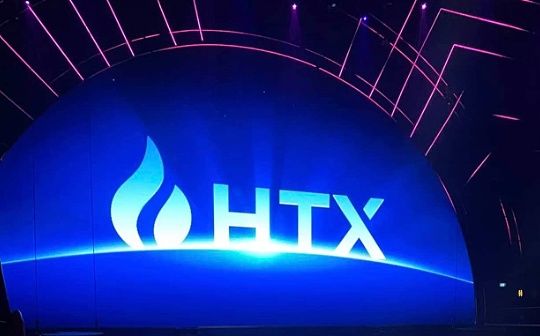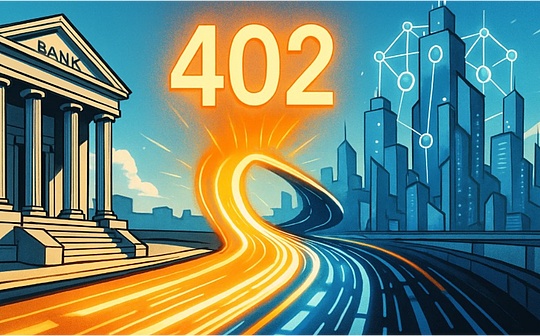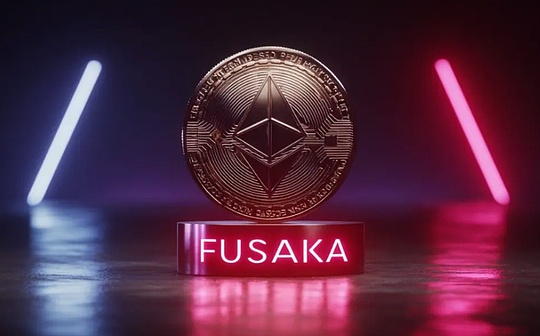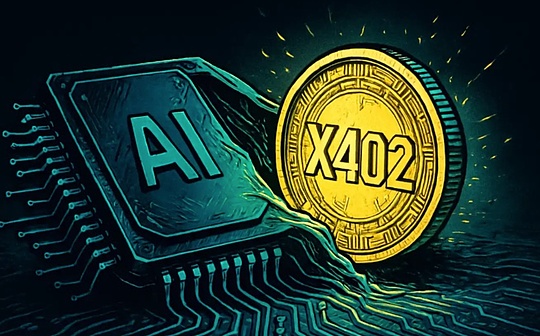
Author: Huohuo, vernacular blockchain
2024 is the year of super elections, with key elections held in dozens of countries and regions around the world, involving a total population of more than 4 billion, of which the US election is undoubtedly the biggest focus of attention.However, unlike in the past, among all the super political action committees participating in the 2024 U.S. election, the topic of cryptocurrency ranks third.
I still remember that four years ago, it was rare for presidential candidates to discuss Bitcoin during their campaigns.Three years ago, when El Salvador was the first to use Bitcoin as a fiat currency, most people were on the watch. However, in the primary election last year, the situation began to change, and the era of crypto is on the political margin seems to have passed.Gone again.
On the one hand, the showdown between former President Trump and current President Biden is making various efforts to win the support of crypto voters; on the other hand, many crypto companies plan to inject a lot of cash into the 2024 US presidential election, and there are already signsIt shows that these funds are helping the crypto industry win more support in Washington.
In addition, among the 12 primary candidates who participated in the 2024 US presidential election in 2023, five presidential candidates clearly publicly expressed their support for the Bitcoin and crypto industry, and Argentine President Javier Mile at the end of December 2023Election, it is reported that Mile’s policy proposals include implementing dollarization, termination of currency controls, closure of central banks, significantly reducing state spending, and actively supporting Bitcoin…
 Argentina President Javier Mile
Argentina President Javier Mile
So which presidents and regions around the world clearly express their support for Bitcoin?
01El Salvador: Naibu Bukel
El Salvador became the first country in the world to officially recognize Bitcoin as a fiat currency in 2021.In 2021, El Salvador designated Bitcoin as fiat currency and also launched the government-designed digital wallet app Chivo Wallet through which users can pay in US dollars or Bitcoin.At that time, Bitcoin was trading at about $36,000.
The decision was led by El Salvadorian President Naibu Bukel.On the one hand, El Salvador is an agricultural-driven economy, which relies too much on overseas remittances as an important part of GDP; on the other hand, after taking office, Bucker was eager to lead El Salvador to the path of prosperity, plus hisA political party has 64 seats out of 84 seats and has absolute decision-making power.
When the price of Bitcoin fell to a low of about $16,000 in November 2022, Bucker announced that El Salvador would start buying one bitcoin daily.
In March 2024, according to foreign media reports, Bucker said that his country’s Bitcoin holdings may exceed public estimates, and posted on Twitter that El Salvador is earning Bitcoin-related income through its passport program., converting Bitcoin into USD for local corporate, mining and government services, said the Bitcoin investment portfolio has a market value of nearly $205 million and has made $83 million profit from its Bitcoin investment strategy.
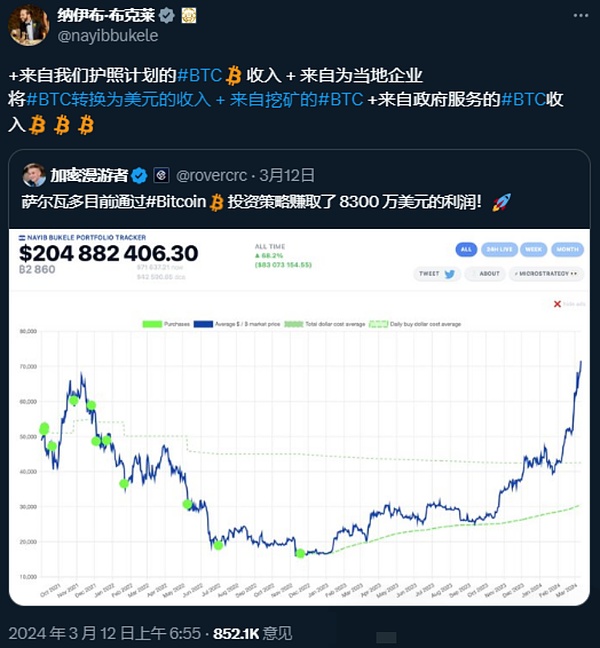
Then on March 14, Bucker posted again that his country was preparing to deposit “a large part of” of Bitcoin assets into related offline devices such as “cold wallets”.
However, a study published in the journal Science in December 2023 showed that since El Salvador adopted Bitcoin as a fiat currency, Bitcoin has not been widely used, and “digital payments (application scenarios) are rare and concentrated.”
02US President (former president, candidate)
The next presidential election will be held in the U.S. at the end of 2024, and while polls will not begin until November 5, 2024, dozens of U.S. politicians have expressed their intention to compete with current Democratic President Joe Biden.
Of the 12 candidates participating in the 2024 U.S. presidential election, 5 presidential candidates who explicitly publicly support Bitcoin and crypto assets include four Republican candidates: Donald Trump and Ron DesanTiss, Francis Suarez, Vivek Ramaswami, and Robert Kennedy Jr. of the Democratic Party.According to data from FiveThirtyEight at the time, Donald Trump had the highest approval rating at 54% among Republicans who had announced their candidacy; Ron DeSantis ranked second at 17%.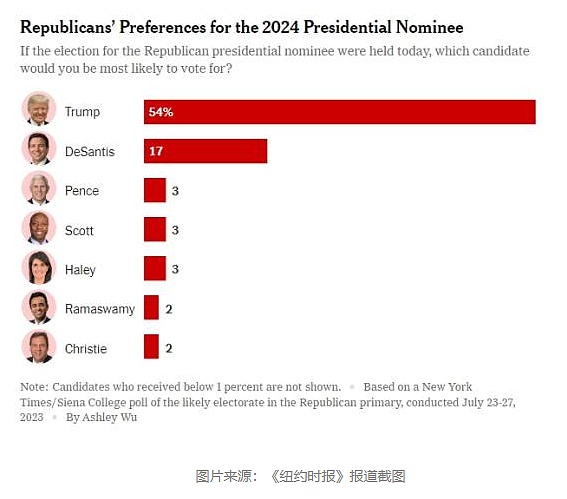 Sure enough, Trump and Biden started the “crypto election” battle.
Sure enough, Trump and Biden started the “crypto election” battle.
As we all know, the current Biden administration (Democrats) seems to have been taking an anti-crypto stance, so once a candidate who supports crypto is elected, this could have a huge impact on the next crypto bull market.Judging from the current party’s attitude towards encryption, most Democratic parties led by Biden are more cautious about encryption, especially after the collapse of FTX, the Democratic Party has firmly strengthened the direction of strict supervision.Most Republicans led by Trump, perhaps to show their differences in political views, have rarely shown their inclusive attitude towards encryption.
As Trump shouted “crypto-friendly” all the way and supported technological innovation, he also opened the crypto-donation website in May.Biden and other Democrats could not sit still and began to relax. They simultaneously announced the recruitment of Meme managers.
Perhaps crypto accounts for a very small part of the entire US election, but this does not mean that crypto voters are not important. It may be that a small policy will affect voter support more.
1) Donald John Trump
Although Trump has been publicly expressing his negative attitude towards encryption during his previous presidency (January 2017-January 2021), he believes that crypto assets are “thin air”, but in the past two years, he has been in actionVery “honest”, becoming one of the presidential candidates who are the best at playing cryptocurrencies.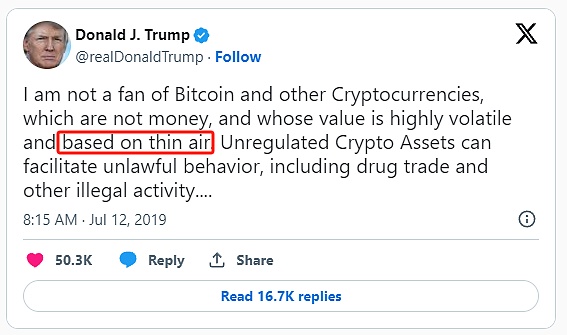 His NFT project, Trump’s digital collection card, launched on December 16, 2022, received a total of $4.87 million after all sold out.In his crypto wallet, which is suspected to be himself, according to the Washington non-profit organization Citizen Responsibility and Ethics (CREW) disclosed on August 14, 2013, it also holds up to nearly $2.8 million in crypto assets (ETH).
His NFT project, Trump’s digital collection card, launched on December 16, 2022, received a total of $4.87 million after all sold out.In his crypto wallet, which is suspected to be himself, according to the Washington non-profit organization Citizen Responsibility and Ethics (CREW) disclosed on August 14, 2013, it also holds up to nearly $2.8 million in crypto assets (ETH).
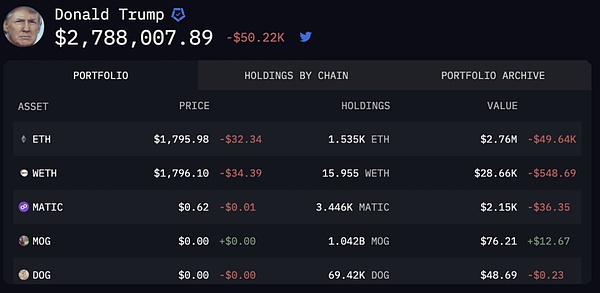
Currently, Trump leads other Republicans with considerable advantage in the polls. However, as more and more Republicans announce their candidacy and Trump is suspected of cases, who will ultimately represent the Republicans in the 2024 US presidential electionStill full of unknowns.
2) Ron DeSantis
On July 31, 2023, during a New Hampshire campaign, U.S. presidential candidate, Florida Governor Ron DeSantis, said about the current situation of the Biden administration’s continuous suppression of crypto assets and crypto institutions since 2023.:
“After I’m elected president, Biden’s war on bitcoin and crypto will end.”
“We will allow Americans to invest in Bitcoin and crypto assets, and no one forces you, but if you want to buy (crypto assets), you can buy it.”
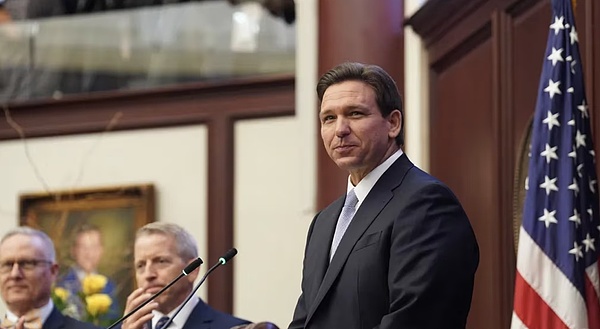
DeSantis also firmly opposes CBDC (central bank digital currency).He believes that unlike cryptocurrencies, central bank digital currencies transfer the power of individual consumers to the central government on a large scale, allowing the federal government to control where the money goes.
DeSantis also said, “If I were president, from day one, we would abolish the central bank’s digital currency.”
3) Robert F. Kennedy Jr.
Another investor in crypto assets is Robert Kennedy, a Democratic candidate who competes for the 2024 U.S. president.He is one of the famous political family, the Kennedy family, and is the nephew of former US President John Kennedy.
On July 24, 2023, Kennedy Jr. attended a Bitcoin conference in Miami and announced that his campaign would be “the first presidential campaign in history to receive Bitcoin donations through the Lightning Network.”
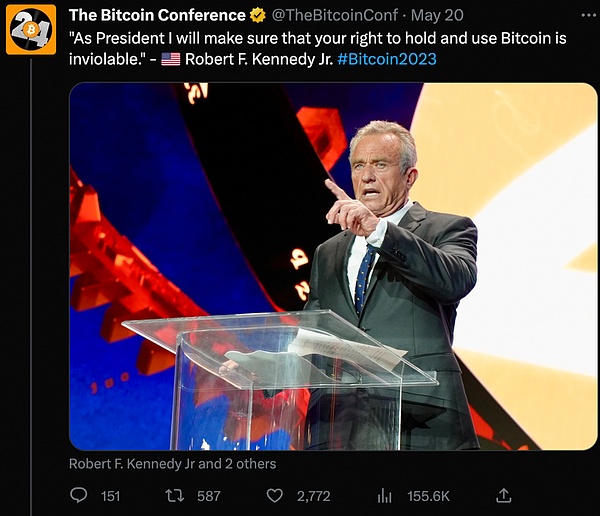
Robert Kennedy speaks at the Miami Bitcoin Conference in 2023
On July 27, he confirmed on Twitter that he did hold Bitcoin and had purchased 2 Bitcoins for each of his seven children.He stressed that Bitcoin is an anti-inflation currency, which gives retail investors freedom rather than holding fiat currencies dominated by the system.He hopes to exempt Bitcoin from capital gains tax.
Like DeSantis, Kennedy Jr. is firmly optimistic about the future of Bitcoin and cryptocurrency, and promises with Volkswagen if elected president., will gradually support the US dollar with Bitcoin.He explained that this is a step-by-step process, with plans to start at a very small scale, and perhaps only 1% of Treasury bonds will be backed in hard currency, gold, silver, platinum or Bitcoin.
4) More
The other two presidential candidates: Vivek Ramaswamy and Francis Suarez, who are currently less likely to become the US president in 2024 from polls, but not without itProbably, and they are also supporters of Bitcoin.
But unlike DeSantis, Vivek Ramaswami said he is a fan of Bitcoin but would not use Bitcoin as a commodity to help stabilize the dollar: “I think Bitcoin is not yet in line with the standards of commodity baskets for a number of reasons. Bitcoin may be part of the commodity basket at some point, but for some technical reasons, I don’t todayWill include it.”
Presidential candidate and Miami Mayor Suarez will accept donations for presidential campaigns using Bitcoin.During his tenure as mayor, Suarez became famous for advocating cryptocurrencies.He vowed to make Miami a Bitcoin center, he practiced it himself, and as mayor, he accepted Bitcoin wages.Suarez is also deeply involved in the development of the crypto industry and believes that the United States needs a president who understands crypto assets and artificial intelligence technologies.
03Argentina President: Javier Milei
Javier Mile, an Argentine economist and formerly a member of the Argentina National House of Representatives and leader of the liberal movement, was successfully elected in the November 2023 presidential election.
Tucker Carlson, a famous American journalist, interviewed Mile, which had more than 421 million views on Twitter.One of the key contents of this interview is the dollarization of Argentina’s economy.In the proposal, Mile has been stressing the importance of canceling the Argentina central bank and talking about the opportunity for Bitcoin to provide this process.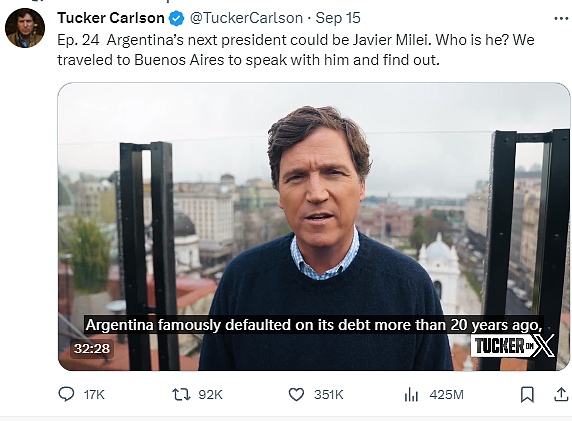 Under his vision, after the closing of its central bank, Bitcoin will become the main force as a remedy for Argentina’s inflation.Before the presidential campaign, Mile had traveled through several talk shows, often promoting the benefits of Bitcoin and crypto assets, believing that “Bitcoin can eliminate the central bank.”
Under his vision, after the closing of its central bank, Bitcoin will become the main force as a remedy for Argentina’s inflation.Before the presidential campaign, Mile had traveled through several talk shows, often promoting the benefits of Bitcoin and crypto assets, believing that “Bitcoin can eliminate the central bank.”
On November 20, 2023, due to Mile’s election, Bitcoin, which was hovering at $30,000, rose by 2.3% in 24 hours.
After his election, especially in recent weeks, contrary to previous reports, the Mile government has not pushed for Bitcoin standards in Argentina..Many news clarifies that Javier Mile does not have relevant policies that actually support encryption, and says that while Mile is positive about Bitcoin and criticizes the central bank, his main economic proposal is dollarization of the Argentine economy, rather than adoption.Bitcoin is legal currency.Mile’s comment on Bitcoin’s “returning money to its original creator, the private sector” was taken out of context, suggesting a broader policy measure to adopt Bitcoin, but that was not what he proposed.
Is this a lesson for the development of the US election and cryptocurrency?
04Mexican presidential candidate: Indira Kempis
Kenpis is currently a senator of the Republic of the 65th Legislature of the Citizen Movement Party.In late August 2023, she announced her intention to become Mexico’s first female presidential candidate due to internal disputes about the party’s future.
Kenpis is well known among Bitcoin and crypto asset advocates because she has been outspoken about the early adoption of Bitcoin that could bring opportunities to Mexico.Since taking office in 2018, the senator has encouraged the crypto economy in the past few years.According to Bitcoin Magazine, she has also pushed Mexico to formulate Bitcoin regulations similar to El Salvador.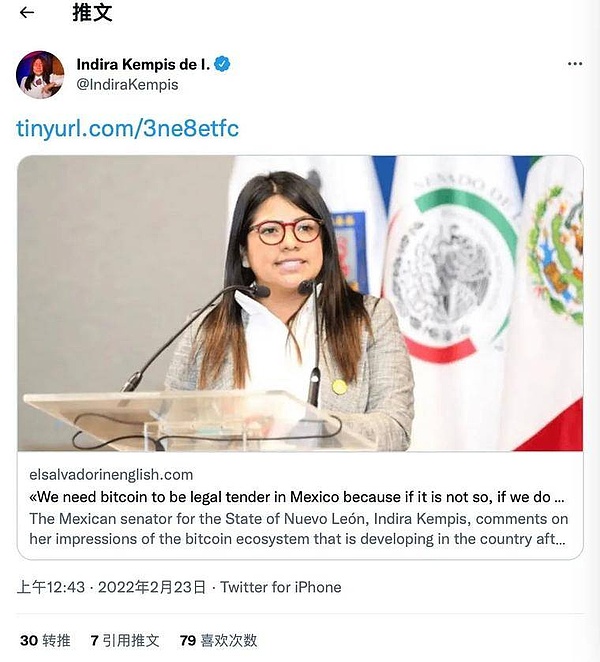
Kenpis introduced the bill to create the CBDC in 2022, when she suggested that the only issuer of the Central Bank of Mexico’s digital peso made her headlines while she did not mention encryption.
However, after the cryptocurrency community criticized the introduction of CBDC, Kenpis added the bill to include Bitcoin in hopes of putting the first crypto asset, Bitcoin, as the fiat currency of Mexico.
The Central Bank of Mexico has not provided an analysis of the CBDC bill, and lawmakers responded in a mixed manner.For example, some senators expressed strong opposition, believing that although Bitcoin was legalized in El Salvador, Mexico “will not accept” Bitcoin as fiat currency.
She has also actively participated in some crypto-related activities, such as in the province of Neu Leon, where she was born in August 2023, where she participated in the promotion of the “My First Bitcoin” course.
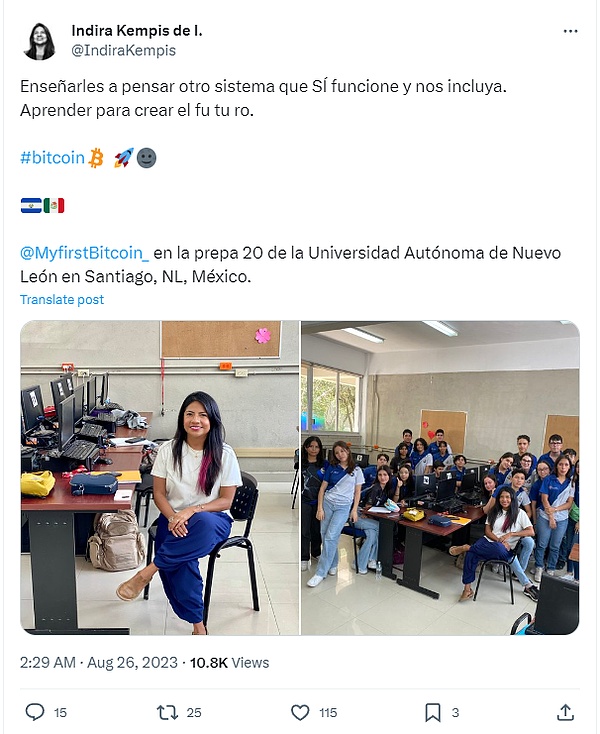
However, the Mexican presidential election began on June 2, 2024. On June 3, Claudia Sheinbaum, the presidential candidate of the ruling National Baath Movement Party, announced his victory in the capital Mexico City.The presidential election was won, becoming the first female president in Mexico’s history, and will begin to rule on October 1, but her crypto position has not been disclosed.
While this result is of great significance to Mexico’s advancement of gender equality in the first place, the current Mexican government is likely to continue its policies and strategies in crypto-regulation in the future and can be kept attentive.
05Current British Prime Minister: Rishi Sunak
The new party of the ruling Conservative Party of the UK, Shurich Sunak, officially took office as British Prime Minister on October 25, 2022.
During his tenure as Chancellor of the Finance Department, Sunak actively promoted economic policy and financial legislation.While there is no clear crypto incident directly related to him, his policies and decisions have had an impact on the UK’s economic and financial sectors.
During his tenure as Chancellor of the Finance Department in April 2021, Sunak proposed that the UK Treasury and the Bank of England explore the creation of a central bank digital currency (CBDC).
In April 2022, Sunak called for recognition of stablecoins as an effective payment method.
Sunak said in a question from a reporter once in a few months before his election that he prefers BAYC compared to Crypto Punks.Compared to choosing one or two cryptocurrencies, he prefers portfolios of multiple cryptocurrencies.But he has a very high attention to encryption and has been around for a long time.
After taking office, Sunak began to promote the British pound stablecoin and said, “My ideal is to make the UK the center of global crypto asset technology.” He then included stablecoins in the scope of regulation and made cryptocurrencies one of the recognized payment methods.
And in April 2023, he also proposed to build the UK into a crypto-friendly technology center and plans to launch the official UK NFT.
However, the UK election will be held on July 4, 2024, a day that could cause the ruling Conservative Party to lose power.Labour is currently expected to win upcoming elections, and Labour has not yet clarified its position on the crypto industry and is currently silent on crypto legislation, but they have expressed their desire to become a tokenization hub and expressed support for EnglandBank’s digital pound plan.
06President of the Central African Republic: Faustin-Archange Touadéra
The President of the Central African Republic is a loyal “believer” of Bitcoin and has always supported and committed to the promotion and application of Bitcoin.In April 2022, Bitcoin was announced to be adopted as fiat currency, and tax payments were accepted for crypto payments. In addition, a legal framework was established to regulate the use of cryptocurrencies, which made the Central African Republic the second formal adoption of Bitcoin after El Salvador.The country with fiat currency is also the first country in Africa to adopt Bitcoin as a payment currency.
In April of the same year, he pushed the National Assembly of the Central African Republic to pass a bill announcing the adoption of Bitcoin as a fiat currency to help the country’s economic recovery and construction.
In May of the same year, Project Sango, the “Crypto Center” project was released to attract global crypto enthusiasts, and plans to build an encrypted island and a digital wallet.It also stated that the Chinese and African legislature has passed the Tokenization Act to approve the tokenization of land and natural resources.However, as the crypto bear market deepens, the plan has not developed smoothly.
But the Chinese President said, “If everyone is not optimistic about Bitcoin, then we will issue our own country’s cryptocurrency.”
In July of the same year, China Africa launched a public sale of the national cryptocurrency Sango Coin, positioning China Africa as a “crypto-economy country”.Sango Coin is deployed on the Bitcoin sidechain and interacts with the Bitcoin mainchain, allowing users to trade between Sango Coin and Bitcoin.The initial public sale price was US$0.1, the total supply was 21 billion pieces. Token sales were divided into 12 cycles, and the price gradually rose to the final $0.45.Central Africa also provides various empowerments such as purchasing and pledging of Sango Coin in exchange for citizenship, obtaining electronic residence rights or obtaining land property through pledging of Sango Coin.
However, two months after the Sango Coin was sold, the Constitutional Court of the Central African Republic ruled that using Token to purchase land and citizenship was unconstitutional.In addition, the country’s national parliament announced in March this year that it would change Bitcoin from fiat to benchmark cryptocurrency.
It can be said that despite the ups and downs, China and Africa are still exploring this road.
07Japanese Prime Minister: Fumio Kishida
The Japanese government is relatively open to crypto, is considered one of the leading markets for crypto assets around the world, and has adopted a series of regulations and measures to regulate and promote the development of cryptocurrencies.
In April 2017, Japan officially regarded crypto assets as a legal means of payment and promulgated the Payment Services Act to regulate crypto CEX/DEX and service providers.
In addition, the Japanese government has established a special agency, the Financial Services Agency (FSA), which is responsible for overseeing the encryption of CEX/DEX and related businesses.The FSA reviews the exchange and takes measures to ensure the safety of users’ funds.
In November 2021, Fumio Kishida, who was born in the Liberal Democratic Party, was elected as Prime Minister of Japan.After taking office, Fumio Kishida said in a speech: “As the labor force shrinks, the urgent need to utilize digital technology, Japan will actively promote digital transformation in the public and private sectors.”
In June 2022, the Japanese Parliament passed a bill that clarified the legal status of stablecoins and defined them essentially as digital currencies. Since then, Japan has become one of the first major economies to introduce a legal framework for stablecoins.
Later, Kishida Fumio proposed to use Web3.0 as the pillar of economic reform, and released a white paper in April 2023 to solve problems such as digital currency tax reform and NFT. The white paper is related to all Web3.0 from NFT to DAO.Things have formulated regulatory proposals.
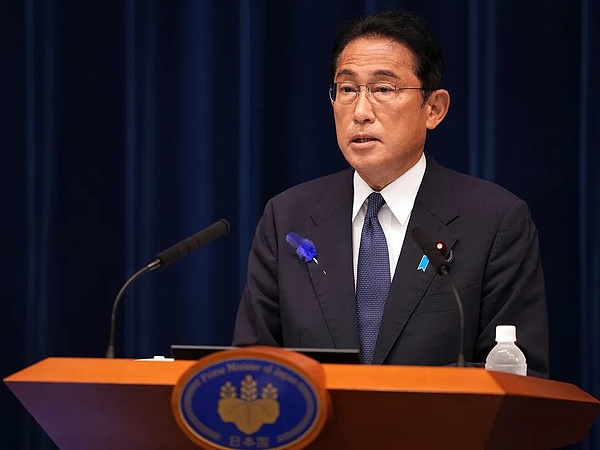
In July 2023, at the WebX Summit held by media CoinPost, Taki said in his speech that Web3 technology has the potential to subvert the traditional framework of the Internet and lead social change, and the Japanese government is working hard to improve the development environment of Web3.
On February 16, 2024, the Fumio Kishida government also approved a bill to enhance Japan’s industrial competitiveness – the Industrial Competitiveness Strengthening Act, which will take measures to add crypto assets to investment limited partnerships to acquire and holdSome asset lists, this is a major change in policy, which will directly allow venture capital companies to invest in projects that specialize in issuing crypto assets.
It can be said that after Kishida Fumio was elected Prime Minister in 2021, he immediately developed crypto-related industries such as Web3.The passage of these bills this year means that Japan will further openly develop digital assets.
08Former Brazilian President: Jair Bolsonaro
Former Brazilian President Bolsonaro has also taken an open and positive stance on crypto policy.He has expressed his support for the legalization of Bitcoin as a fiat currency, hoping that Brazil can become the first country to adopt Bitcoin, without levied VAT or income tax on crypto transactions during his term, and also supported the Brazilian central bank to study the issuance of digital currencies.wait.
In addition, Bolsonaro approved a bill after a long review in the Brazilian Senate in April 2022, the first bill to manage crypto, which will lay the foundation for the creation of a regulatory framework for the country’s crypto industry.
The bill was first proposed by a federal lawmaker in 2015, and finally, Brazil’s former President Jail Bolsonaro signed and passed a bill to legalize cryptocurrencies as a means of payment in Brazil.
Overall, Bolsonaro has promoted the openness of Brazil’s crypto policy, but also hopes to use digital assets to strengthen national sovereignty and control.His policies have played a certain role in promoting Brazil to become a crypto-center in South America.
09summary
It can be seen that crypto assets led by Bitcoin are infiltrating the development history of various countries in economic or political form, and the emergence of crypto asset-friendly countries has accelerated the journey of crypto-related assets to the mainstream finance.
As more countries recognize the potential of blockchain technology and digital currencies, we may see a more integrated and powerful global crypto market.

